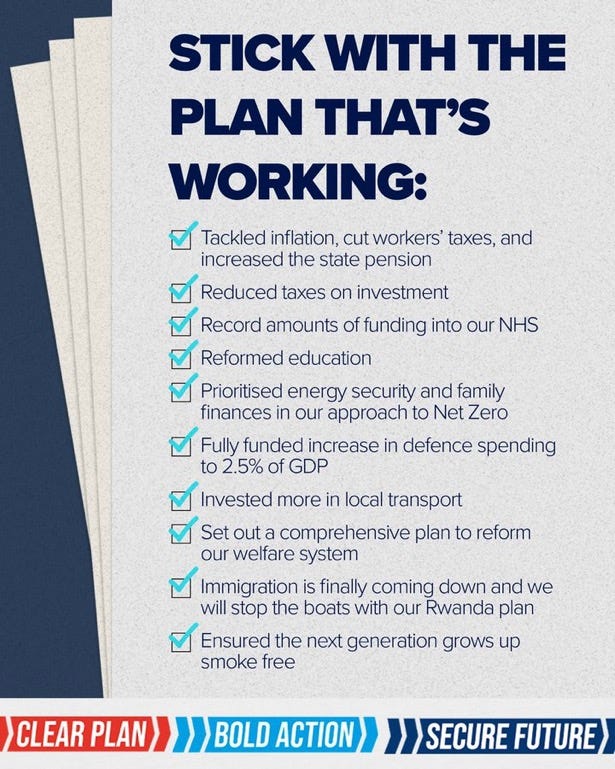Shoddy drafting
On the day the election date was announced last week the Conservatives made an interesting claim, stuck down at the bottom of a graphic they put out on Twitter: they have “ensured” (note the past tense) that “the next generation grows up smoke free”.
The reason this claim is interesting is that it is not true. Rishi Sunak has announced a commitment to ban the sale of tobacco products to people born after 1 January 2009, but the legislation to make this happen has not been passed yet. In fact, the legislation has been abandoned because it ran out of parliamentary time, a direct result of Sunak calling an election for 4 July - something Sunak described as “disappointing” despite being the person responsible for it. As Sunak said, “That’s the type of prime minister I am. That’s the type of leadership that I bring”. Well, OK.
The delay in the smoking ban may be bad news for public health, but it provides a vital reprieve for the Conservative Party. Because when there are no more fag packets, what will they write their policies on the back of?
There’s no getting away from the fact that the stuff they’re putting out at the moment just isn’t very good. See for example Friday’s dossier on Labour’s workers’ rights policies, which calculated the cost to business of various measures the Conservatives claimed Labour are proposing, and ended up with a total of £41 billion per year, or £205 billion over the course of the next parliament. The dossier didn’t get a huge amount of coverage - although it made it into the Telegraph and the Mail1 - and if you’re not professionally required to pay attention to this kind of thing I’m prepared to bet that this paragraph is the first time you’ve heard about it. This lack of impact is, I suspect, not unconnected to the fact that most of the Labour policies the Tories purported to assess are not Labour policies, according to the Labour Party.
The most spectacular bit of the whole dossier is nicely summed up by this short extract from the TUC’s rebuttal document, which reveals an even more serious failing than the Tories not knowing what the Labour Party’s policies are: the Tories have forgotten that they have increased the minimum wage.
There are two main potential negative consequences for a political party of doing shoddy policy work. One is that, like the workers’ rights dossier, it doesn’t get much coverage. The other, which is much worse, is that it does.
That’s the problem with this weekend’s new Tory plan to bring back national service, which they have briefed and branded as a plan to bring back national service despite wanting to make it clear in response to claims that it is like national service that it’s obviously nothing like national service, stop saying it’s like national service.
There is clearly a non-zero constituency for bringing back national service, or for something that can, like this policy, be more or less described as such. Although it is worth noting that there is a non-zero constituency for pretty much any policy you can think of, and that - as Stephen Bush points out - the people this policy is designed to appeal to a) don’t care about it all that much; and b) are more annoyed with the Conservatives over their failures on immigration and crime than over their failure up to now to bring back national service.
There is nothing wrong with announcing a policy with one eye on the fact that it is controversial and will get people talking. Policy announcements are sometimes made specifically in order to do this: change the subject from something damaging, dominate the national conversation, make people look at you in a new way and, if you’re lucky, spook your opponents into doing something silly in response. But to do this successfully, the policy itself has to be pretty robust: people might argue against it in principle (on anything controversial, this is unavoidable) but if the policy has been bombproofed and tested they will find it hard to challenge the detail and your spokespeople will know what they’re talking about and can answer questions with confidence. To put it mildly, that is not what has happened here.
The problem with bringing back national service in the way it is popularly understood - mass compulsory military service for young people - is that it is a terrible idea. That position was concisely and convincingly summarised in a parliamentary answer by defence minister Andrew Murrison as recently as last Thursday. That means that the Conservative proposal is mostly not about military service for 18-year-olds, but other forms of volunteering. And that, in turn, creates a number of possibilities which need to be shot down pretty quickly but haven’t been, and raises a number of questions which the Conservatives have made an absolute dog’s breakfast of answering, which can be summed up as “What do you want them to do?” and “What if they don’t?”
On the “What do you want them to do?” question, the initial Conservative press release mentioned “joining the St John’s Ambulance or helping build flood defences”. That was the whole list. Subsequent briefing material has added other activities including - hilariously and terrifyingly - search and rescue (there is a “non-mountain based” caveat, but less acknowledgement that there aren’t really any safe places with a significant need for search and rescue). Education Secretary Gillian Keegan tweeted that the activities might include “supporting your community during storms”, which somewhat overlooks the problem that storms might choose not to happen at weekends when the national service volunteers are doing their bit.
It is not at all clear that the voluntary sector has the capacity to absorb 700,000 potentially unenthusiastic weekend volunteers, provide them with training and give them meaningful and useful things to do. And incidentally, it is also not at all clear that the armed forces have the capacity to deal with the 30,000 new people they are supposed to take on as part of the programme.
But it is the “What if they don’t?” question that has been hardest for ministers to answer. Initial briefings failed to rule out arresting teenagers who did not take part. Home Secretary James Cleverly later clarified that nobody would face criminal sanction for refusing. Later reports suggested that Sunak was considering requiring future public sector workers to have completed national service (thus either ruling out overseas recruitment into the public sector, or introducing a barrier for British nationals which foreign recruits won’t need to pass), and that “teenagers would be incentivised to sign up for the scheme with fast-tracked interviews for graduate schemes in both the private and public sectors, and the opportunity to highlight National Service on their UCAS applications to help them getting into university”. Obviously, if this last claim is true, then the idea of it being a compulsory programme is dead: you can’t fast-track everyone onto graduate scheme interviews.
The fact that nobody has a clue how any of this is supposed to work is presumably why foreign office minister Anne-Marie Trevelyan flunked an easy question on the radio, failing to rule out the possibility of parents being prosecuted if their children don’t do national service, even though the children in question are 18 and therefore by definition adults. Hi, former Labour Party head of briefing here: this is not funny, politicians only do this when they are very distressed.
There is a third set of problems around funding. First, the programme is to be funded in large part by redirecting the Shared Prosperity Fund, which is a) supposed to be levelling up money and b) supposed to be a Brexit dividend (as an aside, as my colleague Jonathan Simons amusingly points out, this fund also pays for the Multiply adult numeracy scheme, launched as a personal priority of then-Chancellor Rishi Sunak). And second, the closest precursor to the new national service plan, National Citizen Service, had its budget cut by two thirds in 2022 by, you guessed it, then-Chancellor Rishi Sunak.
The policy is supposed to appeal to voters tempted to desert the Conservatives and support Reform, and maybe it will. But the fact that it is such a mess means that it is an easy target, and at least as useful as a way for other parties to galvanise people into voting for them and against the Conservatives. Having used this newsletter over the last few months to try to enhance my own reputation as someone who knows about political attack, I am now going to be reduced to waving my hands a bit and saying “apparently Labour’s attacks on this are going really well on TikTok, whatever that means”, but apparently Labour’s attacks on this are going really well on TikTok, whatever that means.2 I am indebted to actual young person Tom Harwood for tweeting the below image with the caption “Labour’s tiktok game is strong”:
And I am equally indebted to honorary young person James O’Malley, who I assume knows what all of this means, for tweeting the below image with the caption “Some very big numbers on Labour's TikTok meme operation - the Shrek clip now up to 1.8m views.”
So the Tories’ announcement of a policy aimed at younger people but designed to appeal to older people is helping Labour get their messages across to younger people on a medium older people aren’t using anyway. They are getting people talking, not necessarily to their advantage.
The go-to answer for Conservative spokespeople when confronted with awkward questions about the detail of their national service policy is that this will all be dealt with by a Royal Commission if they win the election. Roughly translated, that means “I don’t know”. That’s a problem for a party whose election top line is, as we saw at the top of this post, all about having a plan. On the highest-profile policy of the election campaign so far, they haven’t got a plan at all, and it shows.
The mind boggles at the idea of a Conservative press release that fails to get into the Telegraph or the Mail. It must have happened, but… imagine.








The Lord Farquhar post is now (1 day later) on 2.5 million views on TikTok. The Cilla post is on 2 million views. Given that the UK Labour account has (only) 75k followers it’s definitely getting traction on the fun stuff. The serious posts see to settle at 100k views. Love the writing by the way.
also that graphic is just horrific. it's not even that supposed charmingly naive boomer meme thing, it looks like it's been done by designers but....incompetent ones.